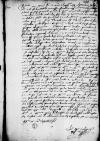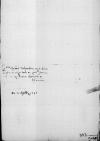List #1721
Ioannes DANTISCUS do Tiedemann GIESELöbau (Lubawa), 1537-09-24
| odebrano 1537-09-25 Rękopiśmienne podstawy źródłowe:
Pomocnicze podstawy źródłowe:
Publikacje:
| ||||||||||
Tekst + aparat krytyczny + komentarz Zwykły tekst Tekst + komentarz Tekst + aparat krytyczny Ekscerpty dotyczące podróży Dantyszka
Reverendissimo Domino
Reverendissime mi Domine, Frater et Amice carissime atque observande. Salutem cum omnis felicitatis accessu, fraternique amoris commendatione.
1537-09-23⌊Heri1537-09-23⌋, postquam puerum Dominationis Vestrae Reverendissimae a me dimisissem, in ipsa meridie mihi adiunctae istae litterae ex
Si et quando ad me Dominatio Vestra Reverendissima ventura est, faciat me paulo ante adventum certiorem, rescribatque mihi, si in usu est apud ecclesiam nostram, quod electus seu postulatus ante confirmationem
Ex
Reverendissimae Dominationis Vestrae integerrimus frater
[1 ] On September 23, Dantiscus received letters from Cracow from Jan Chojeński (cf.
[2 ] At the time, Alexander Sculteti was trying to obtain the Warmia canonry for his nephew Alexander von Suchten (cf. e.g. Alexander Sculteti’s letter to Dantiscus of September 8, 1537 (cf.
[3 ] Fees for church benefices – annates – were introduced in 1316 by Pope John XXII. The beneficiary’s formal pledge to pay the annates was the necessary condition of receiving a provision bulla for the new office. Starting from the Council of Constance (1414-1418), annates from higher-ranking benefices were to be paid in two annual installments at the Apostolic Camera in Rome. The amount of annates was specified for every benefice, though information was also gathered about the actual situation of each beneficiary and analyzed at the consistory during which the provision was to be settled, and this is doubtless where Dantiscus saw a chance for reducing the fee (cf. Dudziak; further references there). Applications for a reduction to the fee seem to have been widespread at the time, as shown, for example, by the Polish episcopate’s letters to the pope in 1537 (cf. VMPL , No. DLXXX, DLXXXI, p. 520-523). See also letters of Dantiscus
cf.

